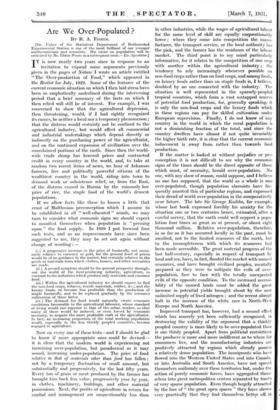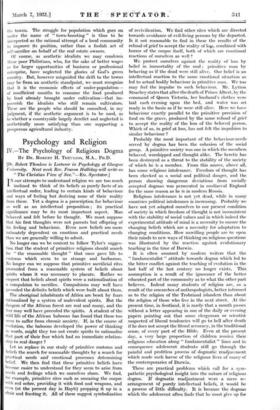Are We Over-Populated ?
By R. A. FISHER.
[Dr. Fisher of the Statistical Department of Rothamsted Experimental Station is one of the most brilliant of our younger mathematicians and scientists. His views on population will be criticized by Mr. Eldon Moore in a subsequent issue.—En. Spectator.] IT is now nearly two years since in response to an invitation to expand some arguments previously given in the pages of Nature I wrote an article entitled " The Over-production of Food," which appeared in the Realist for July, 1929. Some of the features of the current economic situation on which I then laid stress have been so emphatically underlined during the intervening period that a brief summary of the facts on which I then relied will still be of interest. For example, I was concerned to show that the agricultural depression, then threatening, would, if I had rightly recognized its causes, be neither a local nor a temporary phenomenon ; that the distress would certainly not be confined to the agricultural industry, but would affect all commercial and industrial undertakings which depend directly or indirectly on the purchasing power of the agriculturist, and on the continued expansion of civilization over the unreclaimed portions of the earth. Since then the world- wide trade slump has lowered prices and contracted credit in every country in the world, and, to take at random two recent items of news, we hear of Arkansas farmers, free and politically powerful citizens of the wealthiest country in the world, riding into town to demand work or subsistence relief, or, from the East, of the distress caused in Burma by the ruinously low price of rice, the staple food of the world's densest populations.
If we allow facts like these to loosen a little that crust of Malthusian preconception which I assume to be established in all " well-educated " minds, we may turn to consider what economic signs we should expect to manifest themselves when population is " pressing upon " the food supply. In 1929 I put forward four such tests, and as no improvements have since been suggested to me, they may be set out again without change of wording :—
(i. ) A progressive increase in the price of foodstuffs, not neces- sarily relative to currency or gold, for the general level of prices would be of no guidance in the matter, but certainly relative to the goods or materials from which clothes, houses, and other necessities are made.
(ii.) A second symptom should be the general prosperity through- out the world of the food-producing industry, agriculture, in contrast to the industries which produce only materials and consume food.
Within the agricultural industry we should expect to find the non-food crops, tobacco, textile materials, rubber, Sic., and the luxury foods, to become less profitable than the production of staple foodstuffs, and to be replaced gradually by the intensive cultivation of these latter.
(iv.) The demand for food would naturally create economic conditions favourable to the agricultural labourer, whose standard of living would rise superior to that of the urban worker, se that many of these would be induced, or even forced by economic necessity, to acquire the more profitable craft of the agriculturist. In fact, an increasing proportionof the total working. population would, especially in the less thickly peopled countries, become engaged in agriculture.
Now on every one of these tests—and I should be glad to know if more appropriate ones could be devised— it is clear that the modem world is experiencing not increasing over-population, but paradoxical as it may sound, increasing under-population. The price of food relative to that of materials other than food has fallen ; not by a temporary fluctuation of small amount, but substantially and progressively, for the last fifty years. Every ton of grain or meat produced by the farmer has brought him back less value, progressively year by year, in clothes, machinery, buildings, and other material possessions. Next, the profits of agriculture in return for capital and management are unquestionably less than in other industries, while the wages of agricultural labour for the same level of skill are equally unquestionably lower ; where they come into competition the manu- facturer, the transport service, or the local authority has the pick, and The farmer has the residuum of the labour market. The third point is to my mind particularly informative, for it relates to the competition of one crop with another within the agricultural industry ; the tendency to rely increasingly whenever possible on non-food crops rather than on food crops, and among foods, on luxury foods rather than on staple foOds is, I believe, doubted by no one connected with the industry. The situation is well represented in the sparsely-peopled tropical countries, which form a vast untapped reserve of potential food production, for, generally speaking, it is only the non-food crops and the luxury foods which in these regions can pay for skilled cultivation under European superyision. Finally, I do not know of any country in the world in which the rural pop- ulation is not a diminishing fraction of the total, and since the country dwellers have almost if not quite invariably the higher birth rate, it is clear that the current economic inducement is away from rather than towards food production.
If the matter is looked at without prejudice or pre- conception it is not difficult to see why the economic signs of the times should be the direct opposite of those which must, of necessity, herald over-population. No one, with any show of reason, could suppose, and I believe no one has supposed, that the world as a whole is now over-populated, though population alarmists have fre- quently asserted this of particular regions, and expressed their dread of world over-population in the comparatively near future. The late Sir George Knibbs, for example, whose last book expressed forcibly his anxiety for the situation one or two centuries hence, estimated, after a careful survey, that the earth could well support a popu- lation four times as great as at present, or about eight thousand million. Relative over-flopulation, therefore, in so far as it has occurred locally in, the past, .must be ascribed, not to the limited resources of the earth, but to the incompleteness with which its resources had been made accessible. The great material progress of the last half-century, especially in respect of transport by land and sea, have, in fact, flooded the market-with unused resources, and have brought civilized peoples, mentally prepared as they were to • mitigate the evils of over- population, face to face with the totally unexpected evils of the opposite condition. To the' increased accessi- bility of the unused lands must be added the great increase in potential yields brought about by the now unlimited supply of fixed nitrogen-; and the recent abrupt halt in the increase of the white race in North-West Europe and North America.
Improved transport has, however, had a second effect which has scarcely yet been sufficiently recognized, in destroying the validity of the argument that a thickly peopled country is more likely to be over-populated than is one thinly peopled. Apart from politicial restrictions the producer is more and more indifferent as to where his -consumers live, and the manufacturing industries are positively attracted by regions which already possess a relatively dense population. The immigrants who have ' flowed into the Western United States and into Canada, or into Australia and South America, have not spread themselves uniformly over these territories but, under the action of purely economic forces, have aggregated them- selves into great metropolitan centres separated by tracts of very sparse population. Even though largely attracted -by the lure of " the great open spaces " they have shown very praeticallY 'that they- find themselves bettir off is the towns. The struggle for population which goes on under the name of " town:boosting " is thus to be interpreted as.the rational attempt of a local community to improve its position, rather than a foolish act of self-sacrifiee on behalf of the real estate. owners.
Of course, as aesthetic idealists we may condemn these poor Philistines, who, for the sake of better wages or for larger. opportunities of business or professional enterprise, have neglected the glories of Cod's green country. But, however misguided the drift to the towns may be from an aesthetic standpoint, we must recognize that it is -the economic effects of under-population- of insufficient mouths to consume the food produced by land already brought under cultivation_-that im- poverisli :the idealists who still remain cultivators. These are the people who should be consulted, in My judgment, if the aesthetic argument is to be used, as to whether a countryside largely derelict and neglected is aesthetically more satisfying than one supporting a prosperous agricultural industry.-



























































 Previous page
Previous page